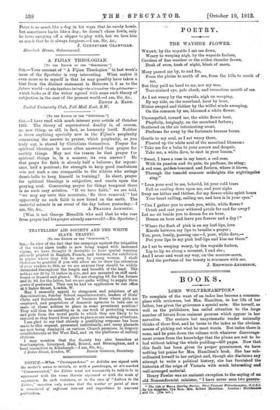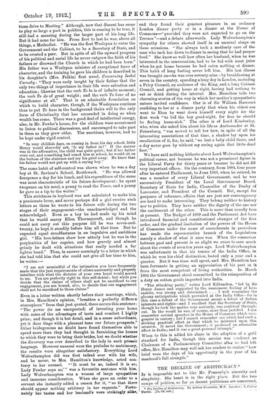B 0 0 K S.
LORD WOLVERHAMPTON.*
• The Lift -of Henry Horan Fowler, First Viscount Wolverhampton, G.0.8.1. • Be hisdanghtcris Tbs MAL Ma. Hobert Hamilton. London; Hutchinson. and Co. [21s. net.] To complain of the want of an index has become a common- ' place with reviewers, but Mrs. Hamilton, in her life of her, father, has given the grievance a special note. She herself, as well as the publishers, has called attention to the large number of letters from eminent persons which appear in her narrative. The curious but unsystematic reader naturally thinks of these first, and he turns to the index as the obvious• means of picking out what he most wants. But index thereis none, and he puts down the volume with whatever discourage- ment comes from the knowledge that the plums are not to be had without taking the whole pudding-688 pages. Now that this fault has been given its proper prominence, we have nothing but praise for Mrs. Hamilton's book. She has sub- ordinated herself to her subject and, though she disclaims any attempt to write a political history, she has furnished the historian of the reign of Victoria with much interesting and well-arranged material.
Henry Fowler was an eminent exception to the saying of an old Nonconformist minister, "I have never seen two genera
-
tions drive to Meeting." Although, now that dissent has come to play so large a part in politics, this is ceasing to be true, it still had a meaning during the larger part of his long life. But it had none for• him. From first to last he was, above all things, a Methodist. "He was the first Wesleyan to enter the Government and the Cabinet, to be a Secretary of State, and to be created a peer. But in spite of all the upward progress of his political and social life he never outgrew the faith of his fathers or disowned the Church in which he had been born." His father was a Wesleyan minister of exceptional force of character, and the training he gave his children is described in his daughter's (Mrs. Felkin) first novel, Concerning Isabel Carnaby : "They were early taught by their father that the only two things of importance in their life were salvation and education; likewise that the verb To be is of infinite moment; the verb To do of great weight; and the verb To have of no significance at all That is an admirable foundation on which to build character, though, if the Wesieyans continue thus to put To have in the background theirs will be the only form of Christianity that has succeeded in doing so when wealth has come. There was a good deal of intellectual energy, also, in Mr. Fowler's house, for the children were accustomed to listen to political discussions, and encouraged to take part in them as they grew older. The emotions, however•, had to be kept under rigid control.
In very childish days, on coming in from his day school, little Henry would shrewdly ask, 'Is my father in ?' If the answer was in the affirmative, the child was quite quiet ; but if his father were out, and something had vexed him at school, he would sit on the bottom of the staircase and cry his grief away. He knew that his father would not put up with a crying boy."
The same habit of self-control was shown when he was a day boy at St. Saviour's School, Southwark. " He was allowed fourpence a day for his lunch, and his expenditure of the same was most characteristic of his future development : he spent twopence on his meal, a penny to read the Times, and a penny
he gave as a tip to the waiter."
This strictness in boyhood was not calculated to make him a passionate lover, and never perhaps did a girl receive such letters as those he wrote to his future wife during the two stages of their engagement—the unacknowledged and the acknowledged. Even as a boy he had made up his mind that be would marry Ellen Thorneycroft, and though he could not carry out this purpose till he was seven-and- twenty, he kept it steadily before him all that time. But he expected equal steadfastness in an impulsive and ambitious girl. " His love-letters show how utterly lost he was in the perplexities of her caprice, and how gravely and almost grimly he dealt with situations that really needed a far• lighter hand." Thus, in answer seemingly to a letter in which she had told him that she could not give all her time to him, he writes :—
"I am not unmindful of the intimation you have frequently made that the just requirements of others necessarily and properly interfere with what the dictates of your own heart would accord to me. You are perfectly right in this self-denial ; but while you decide that the claims of others shall not be sacrificed to our engagement, you are bound, also, to decide that our engagement shall not be sacrificed to those claims."
Even in a letter written shortly before their marriage, which, in Mrs. Hamilton's opinion, "breathes a perfectly differe n atmosphere" from that just quoted, there occurs this sentence: " The power (to me unexpected) of investing your home with some of the advantages of taste and comfort I highly prize; and though it is but detail, and in a sense subordinate, yet it does tinge with a pleasant tone our future prospects." Other bridegrooms no doubt have found themselves able to spend more than they had thought in furnishing the homes to which they were to bring their brides, but we doubt whether the discovery was ever described to the lady in such prosaic language. However unusual were the preludes to matrimony, the results were altogether satisfactory. Everything Lord Wolverhampton did was first talked over with his wife, and he never, to Mrs. Hamilton's knowledge, acted con.
trary to her counsel. " It must be so, indeed it is so; Lady Fowler says so," was a favourite sentence with him. Lady Wolverhampton was a woman of large sympathies and immense consideration. When she gave an order to a servant she instantly added a reason for it, •" so that there should appear nothing arbitrary in her requests." Fortu- nately her tastes •and her husband's were strikingly alike, and they found their greatest pleasure in an ordinary London dinner party or in a dinner at the House of Commons—" provided they were not expected to go on the Terrace"—and a debate afterwards. Lady Wolverhampton's sympathy for• others showed itself in an unusual shape on these occasions. " She always took a motherly care of the man who took her down to dinner• in seeing that he had proper• food." She knew so well how often her husband, when he was interested in the conversation, had to be fed with meat juice when he got home because he had eaten nothing at dinner. This habit of long fasting never left him. His last illness was brought on—he was over seventy-nine—by breakfasting at seven in the country, spending along day in London, including a Privy Council, an audience of the King, and a long Cabinet Council, and getting home at eight, having had nothing to eat or drink during the interval. Mrs. Hamilton tells two charming stories of the way in which her mother's sympathetic nature invited confidence. One is of Sir• William Harcourt confiding to her at a dinner party that when his eldest sou went to Eton he went down himself every night for the first week " to bid the boy good-night, for fear• he should be feeling home-sick." The other• is of Lord Kimberley, who, when she asked him about his life as Ambassador at St, Petersburg, -" was moved to tell her how, in spite of all the interesting associations of that time, a shadow lay upon his recollection of it, for, he said, ' we lost a baby child there, and a day never goes by without my seeing again that little dead face.' " We have said nothing hitherto about Lord Wolverhampton's political career, not because he was not a prominent figure in the Liberal Party for thirty years or because he did not fill very important offices. On the contrary, from 1884, four years after he entered Parliament, to June 1910, when he retired, he was a member of every Liberal Government, and he was successively President of the Local Government Board, Secretary of State for India, Chancellor of the Duchy of Lancaster, and President of the Council. But, except foe purposes of reference, affairs that are just not contemporary are hard to make interesting. They belong neither• to history nor to politics. They have neither• the dignity of the one nor the excitement of the other. This is more than usually true at present. The Budget of 1909 and the Parliament Act have introduced financial and constitutional changes of the first order•, and the gradual limitation of the powers of the House of Commons under the name of amendments in procedure has made the representative branch of the Legislature merely a shadow of what it once was. When the connexion between past and present is so slight we cease to care much
about the events of even ten years ago. Lord Wolverhampton was unfortunate in that his tenure of. the India Office, in which he won his chief distinction, lasted only a year and a quarter. But it was time well spent, and Mr•s. Hamilton has been fortunate in getting an appreciation of his part in i4 from the most competent of living authorities. In March 1894 the Government stood committed to the reimposition of a duty on cotton goods imported into India.
"The attacking party," writes Lord Hilbracken. "led by Sir Henry James and supported by the unanimous feeling of Lan- cashire, was strong and determined. . . . I well remember the gloomy anticipations which prevailed at the India Office—for in this case a defeat of the Government meant a defeat of Indian interests and rights—and I recollect that the Secretary of State, though he took the matter very seriously, was confident through- out. In the result he was, of course, more than justified. I can
remember several speeches in the House of Commons which were greater in oratory ; but I cannot remember one which had such a striking practical effect as that which he delivered upon this occasion. It saved the Government ; it produced an admirable effect in India ; and it was a great personal triumph."
When to this is added his share in the adoption of a gold
standard for India, though this service was rendered as Chairman of a Parliamentary Committee after be had left office, Mr•s. Hamilton may well ask her• readers to realize " bow brief were the days of his opportunity in the year of his
manhood's full strength."















































 Previous page
Previous page